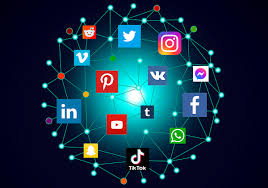In today’s digital age, social media has become an indispensable part of everyday life. It has transformed how people communicate, how businesses market their products, and how entire cultures are shaped. From the early days of platforms like Facebook and Twitter to the rise of Instagram, TikTok, and beyond, social media continues to evolve, becoming a powerful tool that connects people across the globe and enables brands to reach their audiences like never before.
In this article, we’ll explore the multifaceted power of social media, its impact on both individuals and businesses, and how it continues to shape the world in 2025.
1. The Rise of Social Media: A Global Phenomenon
Early Days: The Birth of Social Platforms
The journey of social media began in the early 2000s with the launch of platforms like Friendster (2002) and MySpace (2003), which allowed people to connect online, share personal information, and network with others. However, it wasn’t until the advent of Facebook in 2004 and Twitter in 2006 that social media truly began to change the world.
By offering users the ability to share real-time updates, photos, and thoughts, social media platforms quickly gained widespread adoption. Facebook, which initially started as a college-based platform, soon expanded to the general public, amassing billions of active users. Twitter introduced the concept of short-form, real-time updates, while LinkedIn became the go-to platform for professional networking.
The Explosion of Visual Platforms
By the late 2010s, social media began to shift toward visual content, with platforms like Instagram (launched in 2010), Snapchat (2011), and TikTok (2016) prioritizing images and video content. These platforms capitalized on the growing demand for instant, visually-driven communication, attracting a younger demographic eager to share experiences and create viral content.
TikTok, in particular, revolutionized the way people consumed media. Short-form videos, often paired with catchy music, enabled users to create viral trends that transcended regional boundaries. The ease of content creation and sharing made TikTok a global sensation, with millions of people using the app to share their creativity, talents, and experiences.
2. The Power of Social Media for Connecting People
Global Connectivity and Communication
One of the most profound impacts of social media is its ability to connect people across the globe. In a matter of seconds, individuals can communicate with friends, family, and strangers from different continents. This has broken down geographical and cultural barriers, fostering a sense of global community and understanding.
Social media platforms have given rise to online communities centered around shared interests, hobbies, and values. These virtual spaces have enabled people to find like-minded individuals, even in remote parts of the world. Whether it’s joining a Facebook group about a niche hobby, participating in Twitter discussions about social justice, or exchanging tips on Reddit, social media has become the go-to platform for building connections and fostering a sense of belonging.
Real-Time Sharing of Experiences
Social media has also changed how we share our personal lives. Platforms like Instagram and Snapchat allow users to document and share their experiences in real time, offering a window into their everyday lives. This has led to a shift in how people perceive “reality,” with users constantly curating content that highlights their experiences, emotions, and milestones.
Social media enables individuals to share major life events, such as birthdays, engagements, and graduations, but it also offers a space to share the everyday moments that make up our lives—small victories, challenges, and feelings. The ability to share personal stories instantly allows individuals to feel more connected to one another, making distant relationships feel closer.
Advocacy and Social Movements
Social media has proven to be a powerful tool for social change. Over the past decade, we have witnessed movements such as #MeToo, Black Lives Matter, and #FridaysForFuture gain traction on social media platforms, demonstrating how these networks can be used to advocate for societal change.
Through the viral spread of hashtags, social media has empowered individuals to speak out, raise awareness about pressing issues, and rally others to take action. Whether it’s raising funds for charitable causes or organizing protests, social media provides a platform where people can voice their concerns and mobilize communities for positive change.
3. The Power of Social Media for Brands
Direct Access to Consumers
For businesses, social media has created unprecedented opportunities for connecting with customers. Brands can now interact directly with their audience, bypassing traditional advertising methods like television and print. Platforms such as Instagram, Facebook, Twitter, and TikTok have become crucial tools for businesses to engage with potential and existing customers in real time.
By using social media, businesses can showcase their products, respond to customer queries, share updates, and even receive instant feedback. This real-time communication builds trust and strengthens customer relationships, helping brands establish a loyal following. Furthermore, social media provides businesses with the chance to humanize their brand, showing behind-the-scenes content or sharing values that resonate with their audience.
Targeted Advertising
Social media platforms offer sophisticated advertising tools that allow brands to target specific demographics based on a wealth of data. Platforms like Facebook Ads and Instagram Ads leverage user behavior, interests, and location data to create hyper-targeted ad campaigns. This has revolutionized how businesses advertise, allowing them to reach the right audience at the right time.
By using the advanced targeting capabilities of social media platforms, brands can run cost-effective marketing campaigns that yield high engagement and conversion rates. This form of advertising is particularly beneficial for small and medium-sized businesses, which may not have the marketing budgets of large corporations but can still create highly effective campaigns using social media.
Influencer Marketing
One of the most powerful trends in social media marketing is influencer marketing. Influencers—individuals with large followings on social media—have become key players in brand marketing, offering businesses the opportunity to reach a highly engaged audience. Influencers often work with brands to promote products in a more authentic and relatable way, using their established trust with followers to drive sales.
As influencers continue to grow in popularity, businesses are increasingly turning to them to expand their reach. With the rise of platforms like TikTok, YouTube, and Instagram, influencer marketing has become an essential tool for brands, particularly in industries like fashion, beauty, and lifestyle.
User-Generated Content (UGC)
In recent years, brands have also embraced user-generated content (UGC) as a marketing strategy. UGC involves encouraging customers to share their own content, such as photos, reviews, or videos, featuring a brand’s products. By leveraging the creativity and authenticity of their customers, brands can create more engaging and relatable content that resonates with their audience.
Brands often run contests, campaigns, or hashtags to encourage customers to generate content. The result is a more organic, community-driven marketing approach that amplifies brand loyalty and extends a brand’s reach.
4. Social Media in 2025: The Future of Connection
Emerging Platforms and New Technologies
As we look toward the future, it’s clear that social media will continue to evolve. New platforms, driven by emerging technologies like artificial intelligence (AI) and augmented reality (AR), are expected to change the way we connect online. With innovations such as virtual spaces, enhanced avatars, and interactive content, social media could become even more immersive in the coming years.
For example, the development of the metaverse, a shared virtual space where users can interact with each other and digital environments, could revolutionize social media by creating entirely new ways for users to connect. In this new space, users might attend virtual events, hang out with friends in digital environments, or even create and sell digital assets. Platforms like Meta (formerly Facebook) are already investing heavily in this new frontier of digital interaction.
Social Media as a Source of Information
Social media is also expected to continue its role as a primary source of information, news, and entertainment. As platforms evolve, they may integrate more advanced tools for curating and consuming content, offering users more control over the types of information they encounter.
However, as the flow of information continues to increase, concerns around misinformation and the ethical use of data will also rise. Social media companies will likely need to implement stricter content moderation policies to address issues like fake news and harmful content.
5. Conclusion: The Enduring Influence of Social Media
Social media has become much more than just a tool for social interaction; it has reshaped how people communicate, how brands market products, and how society addresses key issues. By providing an instantaneous and highly engaging platform for communication, social media has fostered global connections, encouraged self-expression, and sparked social movements.
For businesses, social media offers powerful marketing tools that create new opportunities to engage with customers, grow brand awareness, and increase sales. As technology continues to advance, social media will only become more integrated into our daily lives, creating new ways for people and brands to connect.
Key Takeaways
- Social media has revolutionized communication, connecting people across the globe and fostering a sense of global community.
- Brands leverage social media to engage with customers, run targeted ads, and build brand loyalty.
- The rise of influencer marketing has made influencers powerful brand advocates, shaping the way products are marketed online.
- Emerging technologies like AI, AR, and the metaverse will continue to transform the way social media functions and how users interact.
- The future of social media will likely involve more immersive experiences, greater personalization, and a growing role in social change and activism.
Social media is no longer just a platform for sharing personal experiences—it’s a powerful tool that connects people and brands in profound ways.


Autocad crack
Autocad 2025
autodesk autocad crack
auto cad crack
fl studio crack
fl studio 2025
idm crack
idm 2025
Internet Download Manager crack
revit crack
autodesk revit 2025
autodesk revit crack
photoshop crack
phohoshop 2025
adobe photoshop crack
photoshop keygen
photoshop free